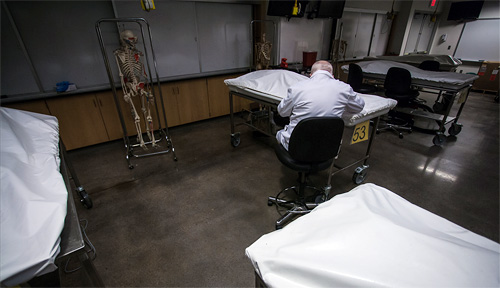Some people who love their jobs have been known to say they’d work for free.
UNMC’s Robert Binhammer, Ph.D., takes that sentiment literally.
The longtime professor of anatomy retired mid-semester last fall, but stayed in the gross anatomy laboratory to continue to instruct first-year medical students, just like he had been for more than three decades.
“I plan to do everything I’ve always done, I just won’t be paid by my department,” Dr. Binhammer said at the time.
But that’s not to say he’ll get nothing for his efforts.
“They’re going to pay my parking.”
Dr. Binhammer “retired” so that the UNMC Department of Genetics, Cell Biology and Anatomy could use his salary line to recruit new anatomy faculty — a precious and rare commodity in health care education.
Not many graduate students go on to be anatomy professors these days. This is so, Dr. Binhammer said, because most graduate students are on grant support and their mentors won’t let them out of lab to undergo the lengthy training needed to become anatomy professors.
This has created an environment at some medical schools where as few as two anatomy professors work to teach hundreds of students, Dr. Binhammer said as he noted that UNMC is fortunate to have several anatomy professors on faculty.
Binhammer’s generosity doesn’t stop at giving up his salary. He also set up a scholarship fund to help support graduate students who may want to become anatomy professors.
“I always tell students that geneticists are a dime a dozen,” Dr. Binhammer said. “But if you go into anatomy and become an anatomy
professor, you will have a job waiting for you when you are done. I guarantee it.”
UNMC’s Kim Latacha, Ph.D., is among the newest generation of anatomy professors. She took gross anatomy from Dr. Binhammer in a one-on-one setting about 15 years ago.
On her first day, she prepared a dissection in a manner she thought would satisfy Dr. Binhammer. But within minutes, the master pointed out countless mistakes in the student’s work.
“Right then I knew I was about to learn more than I ever imagined,” Dr. Latacha said. “I knew it would be an awesome experience.
“And it was.”
Since then, Dr. Latacha’s relationship with Dr. Binhammer has shifted from student to colleague. When she thinks about Dr. Binhammer’s decision to give up his money and time to carry on his educational mission, Dr. Latacha has to fight back tears.
“That he would give back to this profession that has given him so much,” she said. “It just shows you the kind of person that he is.”
Dr. Binhammer puts no cap on how long he plans to continue his work.
“I plan to continue until, well, I can’t,” he said. “I always said if you like what you’re doing, why stop?”
